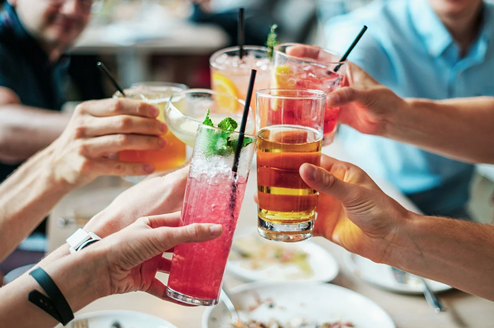by HOJESWINEE KANAGARAJAH
Alcohol has become a normal part of most people’s lives, something we often encounter and partake in during outings, events and in our homes. But do we ever take the time to consider the risks to our health that come with alcohol consumption?
A study by the National Drug Research Institute shows that in 2015, 5785 Australians over the age of 15 died from alcohol-related causes – and cancer was responsible for 36% of those deaths.
Alcohol is attributed to 3% of cancer cases diagnosed each year. In 2018, there were three alcohol-caused cancer hospitalisations in Western Australia every day.
Research shows that the consumption of alcohol can increase the risk of cancer of the mouth, pharynx, larynx, oesophagus, stomach, liver, bowel, and breast. How does alcohol create the risk of cancer?
Alcohol is known as a carcinogen. Carcinogens are agents that interact with a cell’s DNA and interrupt normal cell functions. They may be biological, physical, or chemical and exposure to carcinogens can increase an individual’s risk of getting cancer.
When ethanol – the chemical name for alcohol – is broken down, it becomes acetaldehyde. Acetaldehyde is a toxic chemical. When an excessive amount of alcohol is consumed and our bodies are not able to process acetaldehyde fast enough, it has the ability to damage our DNA.
To add, oestrogen levels also increase with alcohol consumption, leading to an increased risk of breast cancer. Alcohol can also cause changes to the mouth and throat cells, making it easier for other carcinogens, such as tobacco smoke, to be absorbed into and damage our cells.
But cancer isn’t the only effect of alcohol. According to the World Health Organisation, there are over 200 diseases and conditions, mental health issues, and alcohol dependence that excessive alcohol consumption could lead towards.
The risk of developing alcohol-caused cancers and other illnesses is not limited to excessive consumption. Low and moderate alcohol intake levels also pose a risk to our bodies. Did you know, an estimated 400,000 Western Australians are drinking alcohol at harmful levels?
To reduce the risk of harming our health, alcohol intake should be cut back and consumed only in moderation. The National Health and Medical Research Council recommends no more than four standard drinks per day and ten standard drinks per week for a healthy adult.
A standard drink consists of 10 grams of alcohol, which is considered equivalent to:
- Light beer: 425mL
- Full-strength beer: 285mL
- Spirits: 30mL
- Wine: 100mL
- Fortified wine: 60mL
It’s important to be vigilant about the things we partake in and how they can affect our bodies. The choices we make can have long-lasting impacts on our health. Remember, the lesser you drink, the lower your risks of getting cancer and other alcohol-related conditions.
Some ways to cut back on your alcohol intake include:
- Setting limits and keeping track of your drinks
- Choosing alternative drinks made with lower or no alcohol
- Having alcohol-free days
- Reduce the amount of alcohol stored at home
- Being the designated driver during outings
In honour of Dry July, why not take a step away from drinking and go alcohol free for the month? Not only will it bring positive benefits to your health and well being, but you will be supporting a good cause while doing so!
Hojeswinee Kanagarajah began volunteering with Solaris as Communications Assistant this May. She found solace in writing after losing her grandfather to cancer in 2015, and has since developed a strong passion for it. She is now a second-year student working towards a degree in Creative Writing and Journalism, and hopes her words can foster positive change and create connections.






